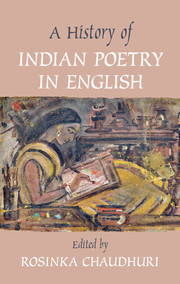Book contents
- Frontmatter
- Contents
- Contributors
- Acknowledgments
- Introduction
- SECTION I THE BROAD NINETEENTH CENTURY: INDIANS IN ENGLISH AND THE ENGLISH IN INDIA
- SECTION II PUBLISHERS, PUBLISHING HOUSES, AND THE PERIODICAL PRESS
- SECTION III POETRY: 1950–2000
- SECTION IV POETS OF THE DIASPORA
- 22 “My First, and Only, Sight”: A. K. Ramanujan and the Five Senses
- 23 U.S.-Based but India-Born: G. S. Sharat Chandra and Vijay Seshadri
- 24 “First and Foremost … A Poet in the English Language”: Agha Shahid Ali
- 25 The Languages of Diaspora: Meena Alexander, Sujata Bhatt, Imtiaz Dharker
- SECTION V THE NEW MILLENNIUM POETS ON THEMSELVES
- Bibliography
- Index
23 - U.S.-Based but India-Born: G. S. Sharat Chandra and Vijay Seshadri
from SECTION IV - POETS OF THE DIASPORA
Published online by Cambridge University Press: 05 March 2016
- Frontmatter
- Contents
- Contributors
- Acknowledgments
- Introduction
- SECTION I THE BROAD NINETEENTH CENTURY: INDIANS IN ENGLISH AND THE ENGLISH IN INDIA
- SECTION II PUBLISHERS, PUBLISHING HOUSES, AND THE PERIODICAL PRESS
- SECTION III POETRY: 1950–2000
- SECTION IV POETS OF THE DIASPORA
- 22 “My First, and Only, Sight”: A. K. Ramanujan and the Five Senses
- 23 U.S.-Based but India-Born: G. S. Sharat Chandra and Vijay Seshadri
- 24 “First and Foremost … A Poet in the English Language”: Agha Shahid Ali
- 25 The Languages of Diaspora: Meena Alexander, Sujata Bhatt, Imtiaz Dharker
- SECTION V THE NEW MILLENNIUM POETS ON THEMSELVES
- Bibliography
- Index
Summary
Separated by nearly fifteen years in terms of birthdates, G. S. Sharat Chandra (1938–2000) and Vijay Seshadri (1954–) both migrated to the United States at roughly the same time, in the early 1960s, as part of the first real wave of South Asians to settle in America. The impact of their consequent deracination resonates throughout their poetry, though the difference in their ages – Sharat Chandra was twenty-four and already successful as a lawyer working for a plantation company when he left India, whereas Seshadri was only five when his family moved from Bangalore to Columbus, Ohio – accounts in part for their distinctive poetic idioms. Sharat Chandra is more colloquial, irreverent, and straightforwardly narrative in scope, while Seshadri is philosophical, urbane, speculative, and possesses a hybrid lyricism that typifies a certain kind of twenty-first-century poetics that has come to be seen as characteristically American, even as his inflections might share something in common with such British poets as W. H. Auden. Sharat Chandra and Seshadri also occupy a special place in American letters, as the former was the first Asian American to be nominated for and the latter the first to win the Pulitzer Prize in Poetry. Seshadri's collection 3 Sections won in 2014, becoming the first book by any Asian-American poet to win that highest of literary honors.
While Sharat Chandra is the elder, Sesahdri's impact on the landscape of American poetry has been more pronounced, so it seems appropriate to begin by looking first at the trajectory of his career. Seshadri's first book, Wild Kingdom, was published in 1996 by Graywolf Press and established a writer of considerable intellect and wit, not to mention someone as comfortable writing a sonnet (“The Refuge,” “A Werewolf in Brooklyn,” and “The Language War”) as a long poetic sequence (“The Lump” or “Lifeline,” which won the 1995 Bernard F. Connors Long Poem Prize when it was published in The Paris Review in 1994 – before being collected in Wild Kingdom).
- Type
- Chapter
- Information
- A History of Indian Poetry in English , pp. 361 - 374Publisher: Cambridge University PressPrint publication year: 2016



